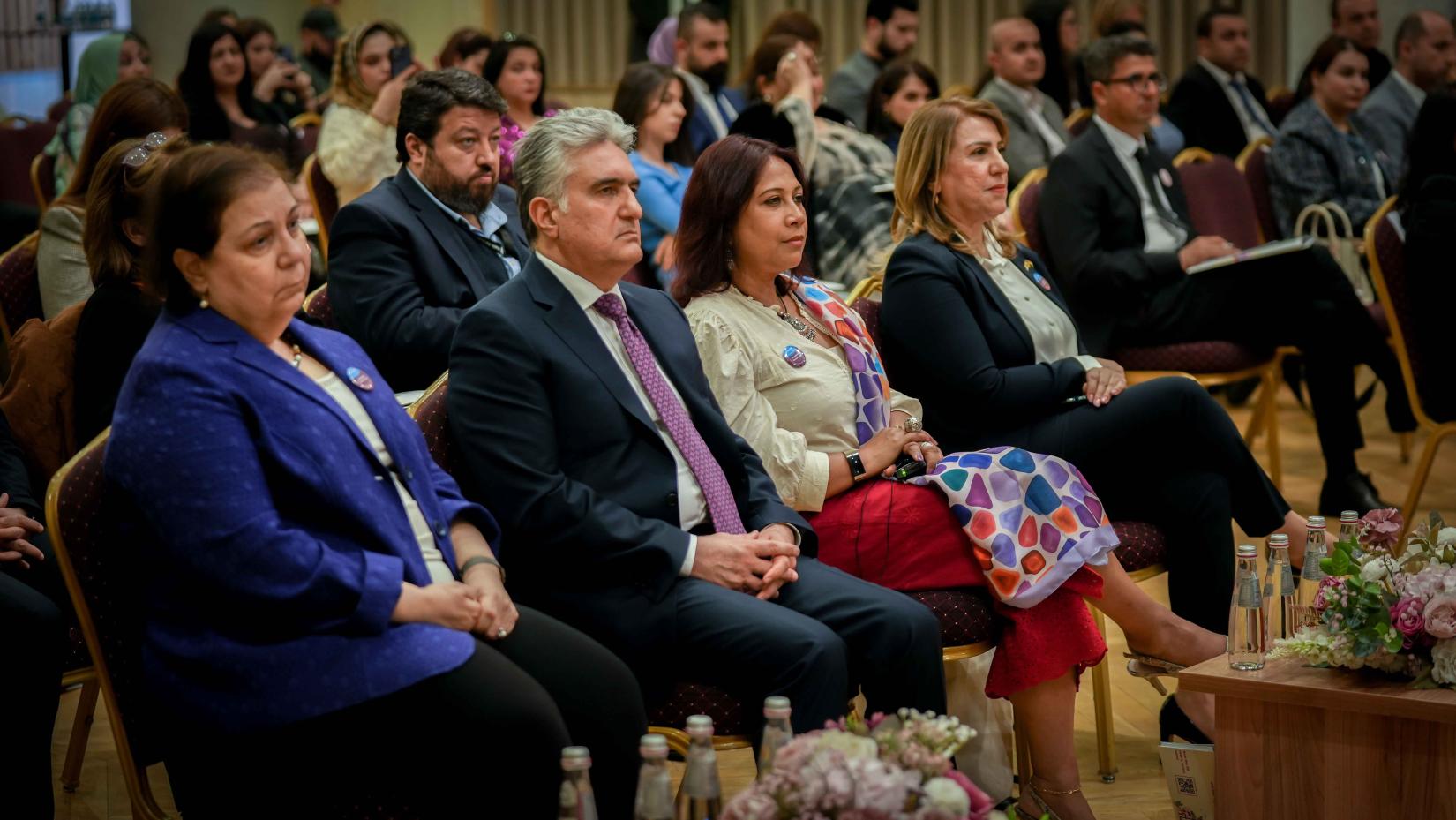On International Women’s Day, the Ministry of Interior of the KRG and UNICEF, with support from USAID/BHA, launch ‘Laaha’, a virtual safe space platform for women and girls in Iraq
09 March 2023

Under the theme of the IWD this year, "DigitALL: Innovation and technology for gender equality”, Laaha, a virtual safe place for girls and women, provides adolescent girls and women to access information, support and services in a safe way.
ERBIL, 08 March 2023 – Marking International Women’s Day (IWD), the Ministry of Interior of the KRG, jointly with UNICEF, and supported by the United States Agency for International Development (USAID), officially launched ‘Laaha’ an online virtual safe space platform for girls and women to provide adolescent girls and women, including those most at risk, with a virtual space to access information, support and services in a way that is safe, culturally appropriate and accessible – even when they are unable to reach a physical safe space.
The launch event included speeches from participating organizations, multimedia presentation of the platform, and the presentation of the results of a special UNICEF U-Report poll on the situation of women and girls.
“Physical safe spaces are a lifeline for many girls and women around the world, giving them access to mental and physical health advice, relationship help and a range of services and support to promote their resilience. But access considerations mean that many can be cut off from vital services and support they can trust - right when they need it the most. UNICEF and the Ministry of Interior, thanks to USAID/BHA funding, and working with women and girls, has created Laaha, a virtual safe space for them and ran by them”, said Adele Khodr, UNICEF's Regional Director for the MENA region.
“In this age, known as the age of technology. The KRG, in collaboration with its partners, has made good efforts to digitize services provided to women. We are gathered here today to announce another important project with the support of UNICEF and USAID and the US Consulate in Erbil, which is the launch of an electronic platform for women. Women can access specialized information in the fields of health, prevention, legal and various other services. Governments and organizations are brought together to make services available to women easily accessible to women in need.” Expressed Mr. Rebar Ahmed, the Minister of Interior of the KRG.
“USAID’s Bureau for Humanitarian Assistance is committed to combatting the scourge of violence against women and girls in Iraq. In partnership with UNICEF, USAID/BHA continues to support GDCVAW and other government line ministries to build technical capacity and promote women and girls’ rights to contribute to longer-term and more sustainable solutions to GBV in the Iraqi Kurdistan Region”, stressed Ms. Carrie Denver, Acting Deputy Principal Officer for the US Consulate. “We commend the Kurdistan Regional Government for their support to the platform, and for working on tools supporting gender equality.”
An increasing number of women and girls across the globe require assistance; yet, in many emergency-affected locations - providing support is often complicated and unpredictable. In addition to exacerbating gender-based violence (GBV) risks, such situations also increase the barriers women and girls face to accessing services, due to cultural norms that restrict their mobility and access to lifesaving services; domestic responsibilities and cultural norms that keep them isolated in their homes; and/or protective approaches employed by their relatives in an attempt to shield them from violence. Across Iraq, threats and incidents of GBV against women and girls persist, particularly sexual violence, intimate partner violence, domestic violence, sexual exploitation, harassment, early and forced marriage.
For International Women’s Day, an online poll was organized via U-Report in Iraq. The poll showed that 48% of the respondents have faced barriers to accessing or using technology because of their gender. In addition, 80% stated that promoting greater gender diversity in tech industry, empowering women entrepreneurs, and creating safer online spaces for women can play a significant role in advancing gender quality.
The poll results also indicated that technology has impacted the life and work of women positively by increasing access to education and providing flexible work options, and by giving women and girls a platform to voice their opinions and advocate for their rights. In exchange, U-Reporters also referred to the potential negative impact of technology in women and girls´ lives, including cyberbullying, online harassment, and the perpetuation of gender stereotypes in media and advertising.
The content on Laaha has been designed for a range of literacy levels through formats including podcasts, videos, simple interactive games, and audio voicer for all text. The platform design also takes into account low bandwidth or unstable internet connections.
Laaha has been built by and for women and girls and has been community-led by NGOs, CSOs and youth-led organisations who have informed the content and functionalities, accounting for digital gender gap.
Content includes topics related to:
• Help and services: including types of services including case management, health, MHPSS, legal; how to support other women and girls in your community; and how to directly access support or assistance
• Relationship & Rights: including decision making and trust; consent in relationships; consent in service provision; understanding types of violence including early marriage and intimate partner violence;
• Body & Health: including pregnancy and birth; menstruation and puberty; female and male anatomy;
• Safety: including information on staying safe online; community safety planning; setting boundaries.
In addition to Laaha, UNICEF continues to work with the Government of Federal Iraq and the KRG in establishing safe spaces for women and girls, as a key approach of reaching and providing them with key information, links to services, skills-building, peer connection, and support. In Iraq, UNICEF has eleven (11) CSO implementing partners for providing services to women and girls, covering 9 governorates with the greatest needs and where there are significant gaps in services. Additionally, UNICEF supports increasing access to comprehensive, multi-sectorial GBV response services, embedded within the available governmental structures, such as health facilities as well as centres managed by GDCVAW in KRI and Family Protection Units in Federal Iraq. Prevention interventions, targeted at changing behaviour, social and gender norms that enable gender inequality and violence to continue, are also implemented through these partnerships and safe spaces. UNICEF utilizes both static women and girls' safe spaces and mobile team service provision approaches to increase access to services.



